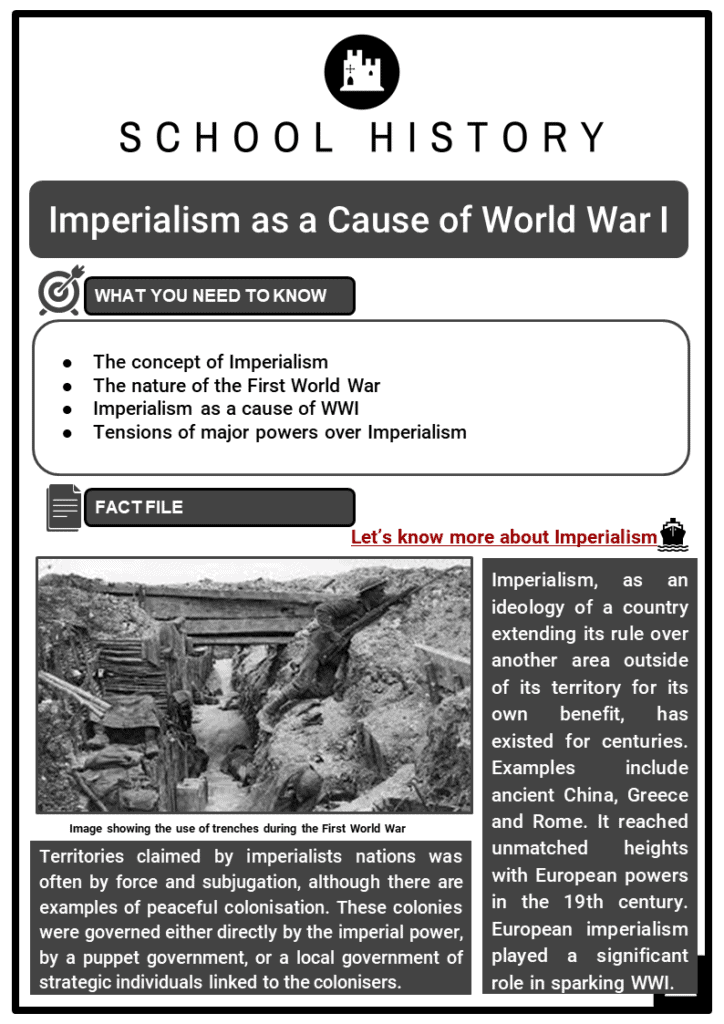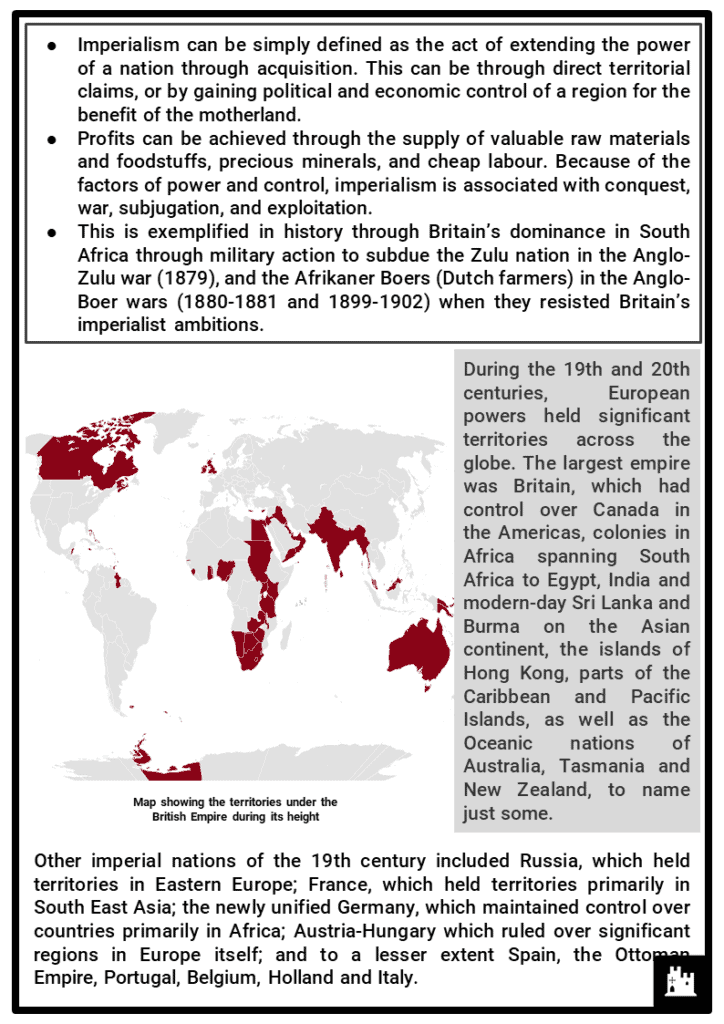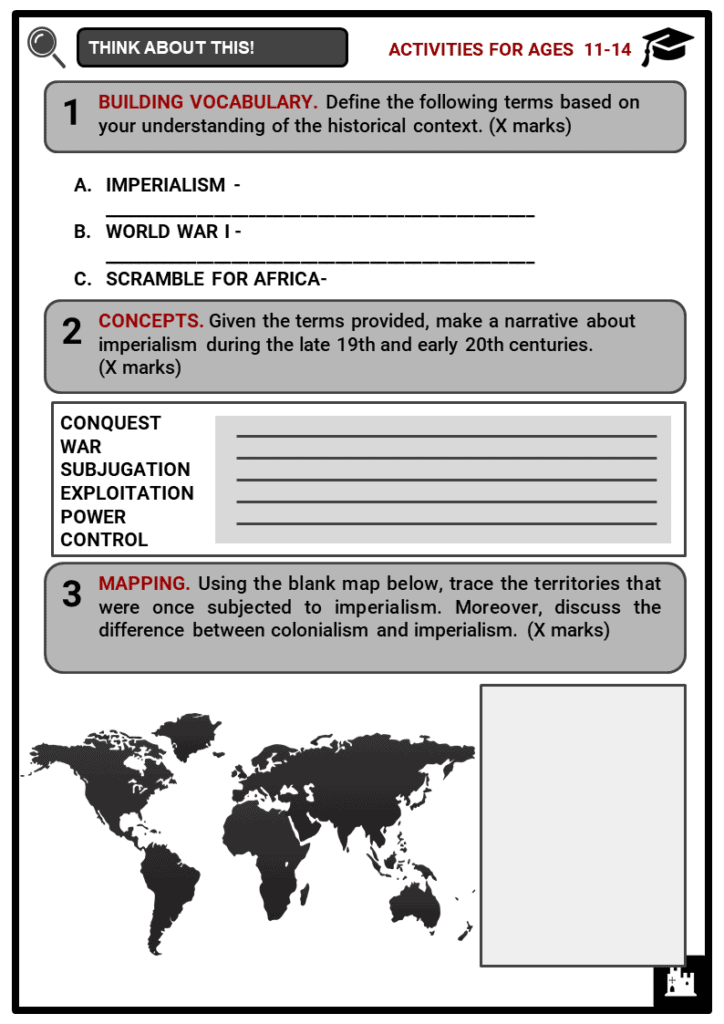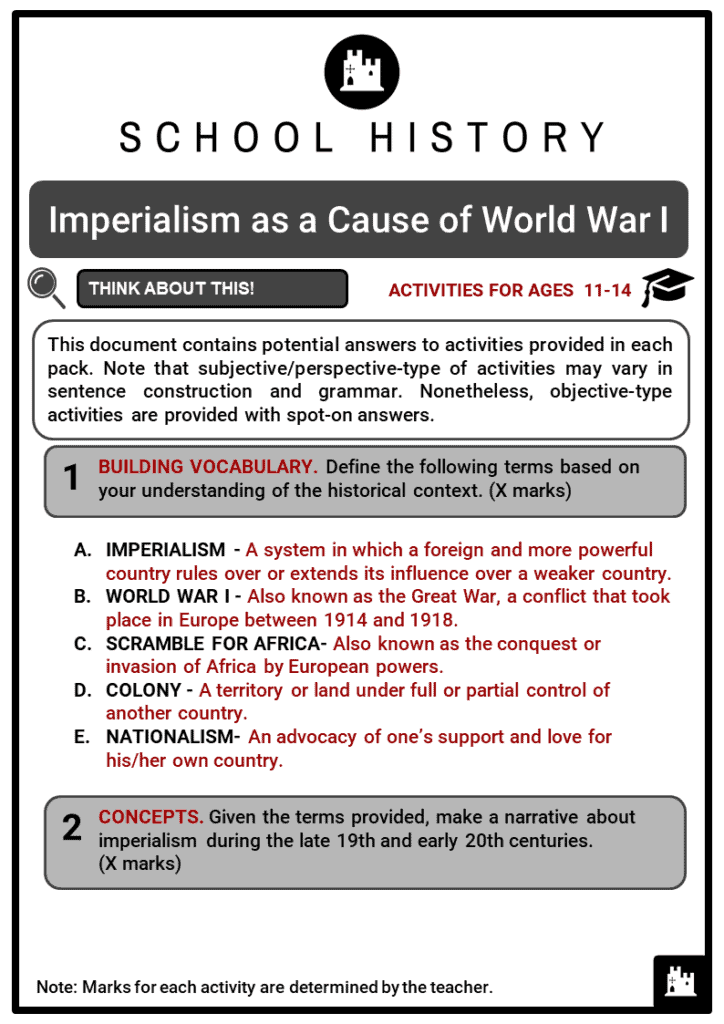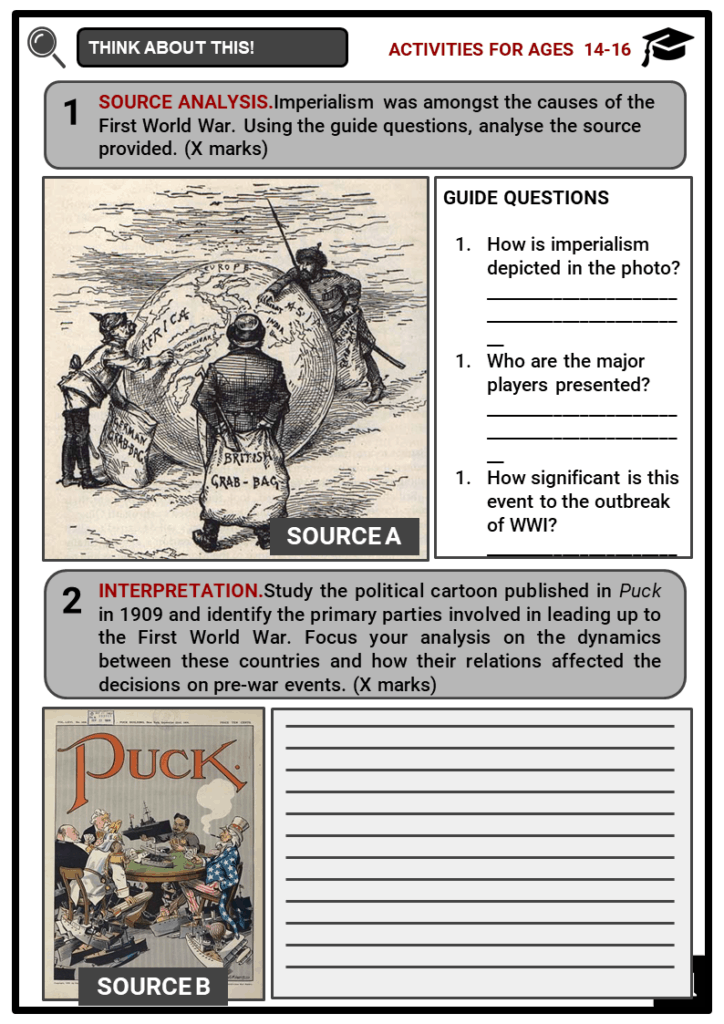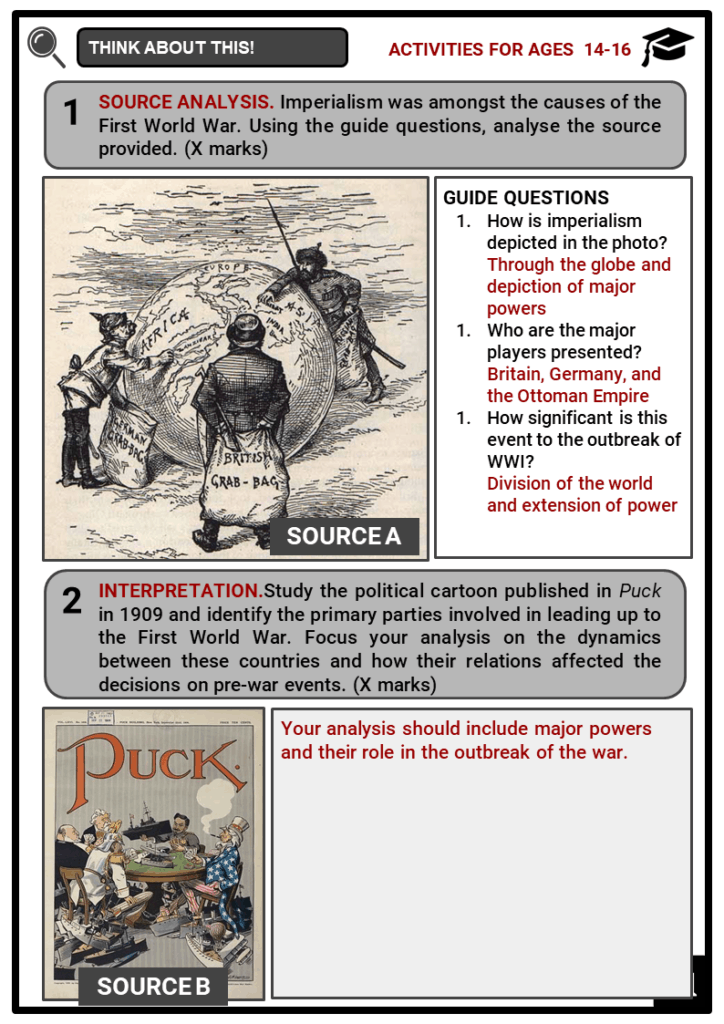Download Imperialism as a Cause of World War I Worksheets
Do you want to save dozens of hours in time? Get your evenings and weekends back? Be able to teach Imperialism as a Cause of World War I to your students?
Our worksheet bundle includes a fact file and printable worksheets and student activities. Perfect for both the classroom and homeschooling!
Table of Contents
Add a header to begin generating the table of contents
Summary
- The concept of Imperialism
- The nature of the First World War
- Imperialism as a cause of WWI
- Tensions of major powers over Imperialism
Key Facts And Information
Let’s know more about Imperialism
- Imperialism, as an ideology of a country extending its rule over another area outside of its territory for its own benefit, has existed for centuries. Examples include ancient China, Greece and Rome. It reached unmatched heights with European powers in the 19th century. European imperialism played a significant role in sparking WWI.
- Territories claimed by imperialists nations was often by force and subjugation, although there are examples of peaceful colonisation. These colonies were governed either directly by the imperial power, by a puppet government, or a local government of strategic individuals linked to the colonisers.
- Imperialism can be simply defined as the act of extending the power of a nation through acquisition. This can be through direct territorial claims, or by gaining political and economic control of a region for the benefit of the motherland.
- Profits can be achieved through the supply of valuable raw materials and foodstuffs, precious minerals, and cheap labour. Because of the factors of power and control, imperialism is associated with conquest, war, subjugation, and exploitation.
- This is exemplified in history through Britain’s dominance in South Africa through military action to subdue the Zulu nation in the Anglo-Zulu war (1879), and the Afrikaner Boers (Dutch farmers) in the Anglo-Boer wars (1880-1881 and 1899-1902) when they resisted Britain’s imperialist ambitions.
- During the 19th and 20th centuries, European powers held significant territories across the globe. The largest empire was Britain, which had control over Canada in the Americas, colonies in Africa spanning South Africa to Egypt, India and modern-day Sri Lanka and Burma on the Asian continent, the islands of Hong Kong, parts of the Caribbean and Pacific Islands, as well as the Oceanic nations of Australia, Tasmania and New Zealand, to name just some.
- Other imperial nations of the 19th century included Russia, which held territories in Eastern Europe; France, which held territories primarily in South East Asia; the newly unified Germany, which maintained control over countries primarily in Africa; Austria-Hungary which ruled over significant regions in Europe itself; and to a lesser extent Spain, the Ottoman
Empire, Portugal, Belgium, Holland and Italy.
Nature of the First World War
- Prior to WWI, the naval superpower of Britain had amassed the largest empire in the world, spanning 25% of the world. It also had rivals, including Germany, Italy, and France, which led to a number of diplomatic crises, especially during the Scramble for Africa.
- In June 1914, the assassination of Archduke Franz Ferdinand of Austria-Serbia led to the outbreak of the First World War. In the following months, European alliances between the Central Powers and Triple Entente defined the nature of the Great War. The war began in 1914 and lasted until 1918 with the signing of the Treaty of Versailles, which changed the geographical setting of Europe and its empires.
- Other causes of the First World War
- SECRET ALLIANCE. One of the primary causes of the First World War was the formation of alliances. The purpose of an alliance is for countries to collaborate to achieve a common goal. Through alliances, countries are able to help each other and fill each other’s gaps and weaknesses.
- ANGLO-GERMAN RIVALRY. Germany and Britain engaged in a naval race that lasted from 1898 to 1912. In 1897, German Admiral Alfred von Tirpitz planned to make a “fleet in being” to force Britain to give up its “splendid isolation.” At the time, Britain had the largest naval fleet in the world.
- With Kaiser Wilhelm on board with the plan, five German Fleet Acts were passed in 1898, 1900, 1906, 1908, and 1912 to fund the construction of a German fleet two-thirds as big as the British Navy.
- The Second Boer War and the Boxer Rebellion secured passage of the Second Navy Law. Worry increased on the side of the British and so, in 1904, newly appointed Admiral John Fisher reorganised the Royal Navy and set out to revolutionise battleships by creating dreadnoughts.
- RISE OF PAN-SLAVISM.
- Pan-Slavists worked to drive forward a sense of unity and establish similarities among the Slavic people through the study of folklore and vernacular. Pan-Slavism was the political belief that the Slavic people of eastern and east-central Europe should have power over their own nations and the right to self-government.
Imperialism as a cause of WWI
- Along with a heightened sense of nationalism that occurred with the above-mentioned nation states, imperialism and its associated rivalries is considered to be a primary contributing factor to the outbreak of WWI. Nationalism can be defined as attitudes and beliefs held by an individual identifying with and supporting their own nation. The attitude of superiority is proliferated through propaganda, and it is often to the detriment of other nations.
- Britain had been building its empire since the 17th century. Come the 19th century, industrial Britain sought to maintain and expand its colonies in order to increase the importation of raw materials such as timber, rubber and cotton, and expand manufacturing and exportation of finished products.
- The increase in trade and enforcement of imperial power was facilitated by Britain’s navy, which was considered the finest in the world. Other nations emerged as imperialistic newcomers in the mid-19th century and leading up to WWI.
- In the aftermath of the Napoleonic Wars (1803-1815) and the Congress of Vienna 1814-1815), empire-building and international relations between the major powers (the Austrian Empire, France, Prussia, Russia and Britain) were increasingly put to the test. Imperialist competition for power, influence and prestige grew and is most famously exemplified in the Scramble for Africa of the 1880s and 1890s.
- In 1870, only 10 per cent of Africa fell under European control. By 1914, however, as much as 90 per cent was formally under the control of various European powers.
- Motivations for claiming territories in Africa included resources, establishing infrastructure such as ports for improved trade and strategic military control, prestige, Christian missionary zeal, attitudes of superiority and civilisation, and exploitation of internal African politics. Such territorial claims were also facilitated by the Berlin Conference of 1884-1885.
Tensions between Major Powers over Imperialism
- As Italy and Germany were newly unified nations in the early 19th century, they quickly developed imperialist ambitions to meet the demand for land and resource, and economic limitations at home. In the late 19th century, German organisations such as the Colonial League proliferated ideas of imperial expansion, which the Kaiser also supported. Germany’s focus lay on Africa and it quickly acquired Togoland, Cameroon and modern-day Namibia.
- Territorial acquisitions strained international relations particularly between rivals Germany and Britain: When Germany claimed the territory of Tanganyika, it caused tension as it interfered with Britain’s ambitions to build a railway line the length of Africa (from Cape to Cairo).
- Other diplomatic incidents that were sparked included Morocco, which was not a French colony but fell under its sphere of influence. France was unable to secure the territory as a protectorate as Germany’s Kaiser had stoked ideas of Moroccan independence when he visited Tangiers in 1905.
- A diplomatic crisis ensued, which was exacerbated in 1911 when a Moroccan rebellion broke out.
- While the French were attempting to subdue the uprising, the Germans landed an uninvited armed vessel (the Panther) at the Moroccan port of Agadir.
- This action brought France and Germany to the brink of war, but also strengthened the alliance between Britain and France, who were becoming increasingly critical of Germany’s foreign policy of Weltpolitik (Germany’s break from the Bismarck era and its ambition to be transformed into a world power).
- Adding further to the tensions between the Major Powers and political instability in Eastern Europe was the steady decline of the Ottoman Empire.
- Described as the ‘sick man of Europe’ from the 1800s, the Ottoman Empire was embattled by the Crimean Wars (1853-1856), the First Balkans War (1912-1913), the Russo-Turkish War (1877-1878), and rising attitudes of nationalism and revolution.
- The Ottoman Empire’s loss of territories resulted in heightened competition between Austria-Hungary, which intended to expand into the Balkans; Russia, that sought to expand to gain access to the Black Sea; and Germany, what had designs to complete a Berlin-to-Baghdad railway. This all came on top of Britain and France having colonial and trade interests in the region too.
- Later in the 19th century, Japan and the United States also began imperialist expansion.

